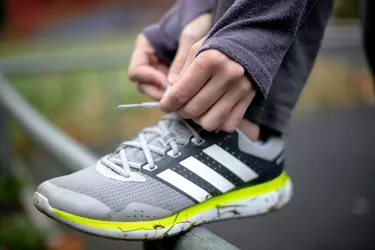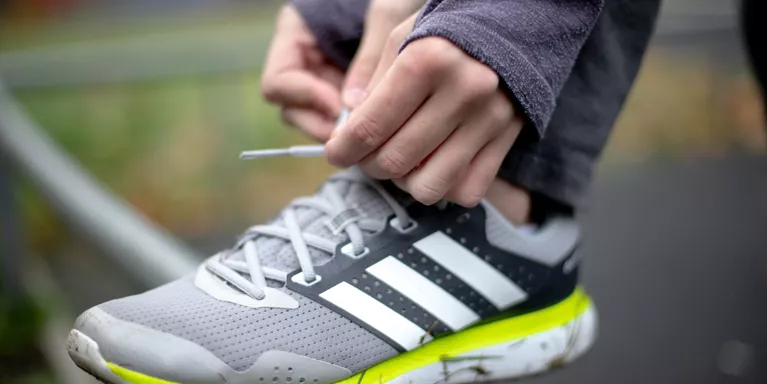The ups and downs of running with bipolar disorder
Laura is Mind's Digital Communications Officer. She writes about her experience of bipolar disorder and about mental health on her personal blog. Today she blogs about why she's found running and training for races quite difficult mentally at times.
This is about my sixth attempt to write this blog. I don’t always find it easy to open up and admit when I’m finding things difficult, and for me there’s something about running that makes it even harder. This isn’t a blog about how I took up running and it really helped my mental health. This is a blog about how I’ve found running and training for races quite difficult mentally at times.
Although I love many aspects of running, it also brings out my capacity for guilt and self-criticism. There can be quite a lot of “no excuses” and “man up” type messages in the running world and I really struggle to keep these in perspective at times, especially when my mood is low.
All through school I hated running. I was rubbish at it. Really properly nearly-always-last rubbish. But, in my mid-twenties, I decided I’d give it a go as an adult to see if I could come to enjoy it, even a tiny bit. You know those runners you see in the street, the ones who look like they’re having a not unpleasant time? I wanted to know what that was all about. I decided to sign up for a 10k. Most of my early runs were a massive slog, but then one day, I was running and I suddenly realised it felt good. Running and feeling good – both at the same time! Running the 10k was amazing – it was something I never thought I’d do. I felt so proud of myself.
After the 10k, injury stopped me running for a while and I struggled to get back in to it. Over the years, there were various reasons for this - one was my mental health. During periods of depression my motivation and confidence were low. When I was eventually diagnosed with bipolar disorder, the medication I took massively zapped my energy, and the weight I put on as a side effect knocked my confidence.
Two years ago, I decided it was time to try again so I signed up for The Royal Parks Half Marathon 2013.
Not long after signing up, before I’d really started training, I sank into a severe depression. I don’t know why – my bipolar episodes usually come on without any apparent trigger.
Depression usually comes with low energy and motivation – I couldn’t have felt less like running, but somehow I forced myself. Some days I’d put on my trainers and head out with tears streaming down my face.
Those runs usually made me feel a bit better in the immediate aftermath, but they couldn’t lift me out of the abyss. I was signed off work – I ended up off for four months. I was struggling with suicidal thoughts most days. I was really quite unwell.
Then my psychiatrist changed my medication. I began taking lithium and it really worked for me. I started feeling better pretty quickly. But the lithium complicated matters in terms of the running. I was advised to be careful about how much I exercised, particularly in the heat. With lithium, water intake and salt levels need to be kept steady, otherwise it won’t work as effectively, and it can even become toxic.
Although I kept on running, I decided the half marathon was a bit much for me then. I was nervous about the medication. I wanted to focus on getting the lithium to the right level, on getting better and on getting back to work. I also didn’t feel I was well enough to cope emotionally with running in front of thousands of people, including many of my colleagues who I knew would be along the route.
I told a runner I knew that I’d decided to pull out. “Those are just excuses”, he said. Those words really stuck with me. And “no excuses” is a message I’ve seen a few times since.
I was well enough to go back to work soon after. I settled on a relatively low dose of lithium and I felt I’d be able to run safely on this, so the next year I signed up again - for the Royal Parks Half Marathon 2014.
Training wasn’t easy. Lithium can make me very tired – I need more sleep and I’m pretty useless in the mornings so running before work isn’t really an option. Often, I’d come back from work feeling zonked too. During the first 10 weeks of my training plan I moved flats, twice. With a lot of time spent looking at potential flats as well as packing and moving, I didn’t always manage the four runs a week in my training plan. I felt guilty. “No excuses” was ringing in my head all the time.
Despite this, I was fairly on track up until week 10 – then I got a cold. No big deal, but then I got a cough, and when I get a cough they usually become chesty and last for several weeks. I rested at first hoping it might go away, but it didn’t. Around this time my mood, which had been stable for nearly a year, dropped.
I started to feel incredibly guilty and self-critical about my decisions. I’d tried taking time off so I’d be fit for the race but I wasn’t any better – I’d just ended up missing loads of training. I found myself crying to a colleague that I must just have a bad attitude to have a cough for so long, and asking why I had missed so much training – was this just an excuse? Lithium can also affect my stomach and this flared up in the fortnight before the run – I felt so nauseous I barely ate. Mentally and physically, I felt like an absolute wreck.
The one aspect of my race preparation which had gone well was my fundraising. I was really overwhelmed by the generosity of my friends and family and felt so supported. But I also started to worry I was letting them down. I was never going to get what most runners would consider a good time, but I wanted to get a good time for me. But realistically, there wasn’t any chance of getting the time I’d initially set my sights on – I was underprepared and still pretty under the weather.
The good news is I did the half marathon. I didn’t want to miss it again and I felt that running it was the right thing for me. I spluttered and coughed all the way round and I had a stitch from mile three right up to the finish line. I’d prepared mentally for it being difficult, but actually, I really enjoyed it. The atmosphere, and my friends, family and colleagues carried me along. I loved being part of team Mind and was really proud of my fundraising. Crossing the finish line was wonderful, but my favourite part was getting a hug from my god-daughter at mile seven.
I haven’t been able to run much since then because I pulled a muscle in my calf shortly afterwards and it doesn’t seem to want to heal. Again, this has been a bit trying for me mentally. It’s been difficult working out whether I should try running on it or resting. When I’ve tried running on it, I’ve injured it again and set myself back to square one. Either way, again, I’ve often struggled with feelings of guilt and self-criticism.
A month ago, my mood started rapid cycling – changing from depression to hypomania about every week. I’m really missing not being able to run at the moment – I think it would clear my head a lot during the depressed weeks and provide an outlet for the hypomania. During one of the low weeks, I ended up crying to my doctor about not being able to run – looking at this positively, I never thought I’d be the sort of person to cry about not being able to run!
I’ve set my sights on more running. I have a place in the Great North Run in September and I’m hoping I might be ready to do the London Marathon for Mind in 2016. I have lots of work to do physically for these, but just as much mentally.
In my job at Mind, I find myself telling people quite a lot to ‘be kind to yourself’. In my running, I really need to work out how to do this alongside having “no excuses”. I think both these messages have their place – I understand the “no excuses” thing and I really want to push myself but I need to learn to keep this in perspective and to make it work for me, to manage the guilt and self-criticism and to know when to give myself a break.
Hopefully then, running will start to be good for my mental health.


Get involved
There are lots of different ways that you can support us. We're a charity and we couldn't continue our work without your help.
Share your story with others
Blogs and stories can show that people with mental health problems are cared about, understood and listened to. We can use it to challenge the status quo and change attitudes.

















